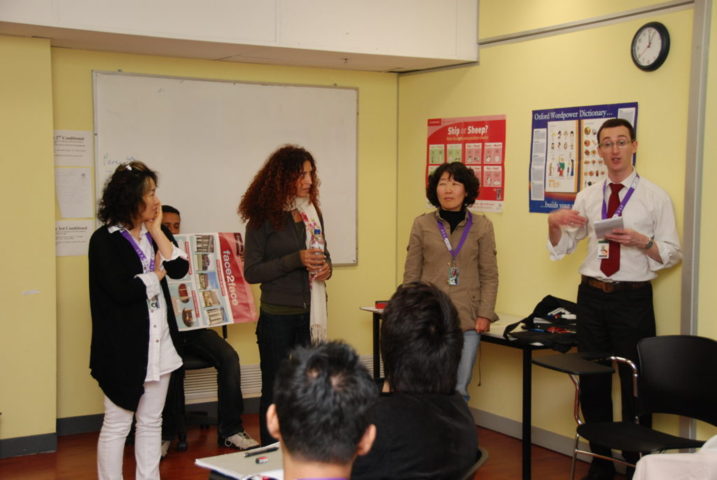Improve your listening skills as you study an English course in Melbourne

One of the hardest parts of learning a new language is learning how to listen to it.
In the real world, native speakers don’t always follow the rules, and often use informal words and slang.
All of this can make listening to English difficult.
It isn’t surprising that many people struggle with listening to English. To better communicate and develop your English skills, you will need to overcome this and learn how to listen to other English-speakers.
Is listening in English a challenge for you?
If so, here are some ways on how to improve your listening skills while completing an English course in Melbourne.
Listen to intonation and stress in English conversations
When you listen to English conversations, pay close attention to intonation (the rise of fall of the voice when speaking), as this can help give you an idea of whether the person is asking questions or giving a command, and tone, which can help you understand how a speaker is feeling.
Additionally, tone will also give you an idea of the kind of emotions that the speaker is trying to convey, like anger, pain, happiness, excitement, or sadness.
Through this, you will be able to guess how different words, phrases, and expressions mean, and how you should be using them!
Rising intonation
For example, “rising intonation” is used to describe a speaker’s voice raising at the end of a sentence. This raise in pitch usually indicates a question is being asked:
“Are you going to the party tonight?”
When English speakers say this out loud (Australians are in fact known for it!), their pitch will rise on that last word, “tonight”.
This is more common in Yes/No questions, rather than open-ended questions (“What did you think of the movie?”)
Falling intonation
Quite the opposite of rising, falling intonation is used to make a definitive statement (though sometimes during open-ended questions, too):
“Let’s meet at the library at 10:30 tomorrow morning.”
“I need some milk, eggs, and fabric softener.”
Enunciation
Enunciation is another thing to keep in mind. Stressing out a particular word can change the meaning of the sentence as well as the speaker’s intent:
“Is this your phone?”
The speaker is emphasising the word “your”, so wants to know if the phone she has does indeed belong to you, not that the device she is holding is indeed a phone.
(In that case, she might pick up the odd gadget, and ask: “Is this your phone?”)
Watch English movies
One great way to familiarise yourself with the language is to make a habit of watching English videos and movies!
We suggest watching a movie you’re familiar with in English, and turning on the subtitles.
Since you already know what happens, you can focus on the words being used instead of the story the movie is telling.
And with subtitles in your native language, you can easily learn the meaning of new words, helping to expand your vocabulary!
As your English listening skills improve, you can try switching off the subtitles and see how you go following along!
Even watching YouTube videos in English can be a huge help, as it can help you become more familiar with conversational and casual English.
YouTube even has an in-built auto translate, to help you keep track of what is being said.
Many more YouTube videos also come with subtitles in other languages created by fellow viewers, helping you understand what is being said.
Listen to English podcasts
Are you a more advanced learner? If so, English podcasts might be helpful!
During your spare moments, use your time to listen to English podcasts on the topic of your choice.
We suggest choosing a subject that you’re already familiar with, whether that’s fashion, true crime, or marketing!
Listening to the podcast whenever you’re moving – whether it’s to and from class on the tram, during a quiet study break, or when you’re getting ready for the day ahead, listing to English podcasts will boost your proficiency!
Not to mention, it will also introduce you to different accents and styles of talking.
The Australian accent is just one of the many varieties of English. If you want to become better at understanding spoken English, you’ll have to learn all the other accents and ways of talking.
Actively take down notes
There’s a good reason we always suggest writing down any new words you hear!
In addition to learning words, phrases and sentences, writing down what you hear can also help with pronunciation and understanding.
That’s because a lot of English words are spelt and pronounced differently – for example, take the word “gnome”, which is pronounced with a silent “g” – so really, you say it like “nome”.
By keeping a notebook handy, you can write down unfamiliar words. It doesn’t matter if you don’t spell them correctly, as long as they’re written down for later.
You might like to also jot down the way they were used, if you can remember.
When you next have some spare time, look up the words on Google to discover their meanings as well as their correct pronunciation.
This neat little trick can help you learn new words that are spelt differently to how they are pronounced.
Make use of Academia’s free clubs and extra classes
Academia offers a range of FREE clubs that allow you to practice your English with other students.
This gives students who are enrolled in our English courses in Melbourne a chance to further develop their skills – outside the classroom!
Two such classes are…
The Academia Movie Club
Watching movies is a great way to improve your understanding of spoken English.
Another great way of doing so is by joining our Movie Club.
Open to all who study English at Academia, the Movie Club allows you to listen to and speak with other students about all your favourite movies!
Not to mention, it’s also a great way of learning about new movies from all over the world that you mightn’t have seen yet!
Academia’s Conversation Club
This optional and FREE class is perfect for those who want to improve their listening, comprehension, and speaking skills with follow students.
Engaging in conversation in a casual group setting can enhance the learning experience by creating a more natural setting that’s close to real-world English usage.
It will also challenge you to focus on listening while there’s background noise – an important skill in the real world!
Discover all the free clubs available when you study English in Melbourne with Academia here.
Improve your listening skills when you study English in Australia
At Academia, we offer a range of different English courses in Melbourne, each tailored to different needs.
Whatever your goals are, our courses can help you get there…
General English (GE)
Code: 074238K
Whether you are a beginner or advanced English learner, General English will help you with your day-to-day life by training your speaking, writing, and of course, your listening.
With 6 different levels for different skill levels, this course is a great choice if you want to improve your English skills overall.
Find out more about our General English course.
English for Academic Purposes (EAP)
Code: 064230K
If you’re planning to study in one of Australia’s universities, then English for Academic Purposes (EAP) can help you succeed.
Universities use different English skills from day-to-day life. You’ll have to:
- Use more formal language
- Understand reports and research papers
- Write to a higher standard
- Listed to more complex and technical language
This English course in Melbourne is tailored for university applicants, and focuses on helping you prepare for the level of English you will encounter in higher education.
Find out more about our English for Academic Purposes course.
English for IELTS Preparation
Code: 068514A
Passing the International English Language Testing System (IELTS) gives you more opportunities to study, work and migrate in English-speaking countries.
This test will challenge your ability to:
- Read
- Write
- Speak
- Listen
The IELTS exam is a necessary preparation for English many businesses and immigration tests.
A good IELTS score is essential if you want to advance your career in many multinational businesses, or move to an English-speaking country.
To help with that, Academia offers English courses tailored to match the content tested on IELTS.
Enrol in an English course in Melbourne with Academia!
Improve your speaking, listening, reading, and writing in English by enrolling in one of Academia’s English courses in Melbourne!
Contact us today, and our friendly team will be happy to assist you.
- Melbourne: (03) 9671 4755
- International: +61 3 9671 4755
- Or fill in the form and we will get in touch!






